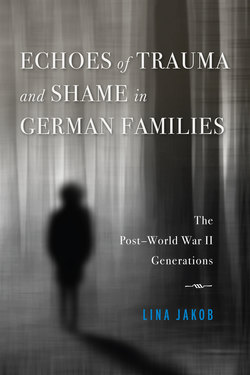Echoes of Trauma and Shame in German Families

Реклама. ООО «ЛитРес», ИНН: 7719571260.
Оглавление
Lina Jakob. Echoes of Trauma and Shame in German Families
Отрывок из книги
Meinen Eltern, in Liebe und Dankbarkeit
Introduction
.....
In addition, my interviewees had only recently come to consider the psychological impact of the war on their families and by extension themselves. They had previously attributed their emotional problems to other causes. They were “re-writing the past,” as Ian Hacking (1995) described in the context of multiple personality disorder (now called dissociative identity disorder): they were superimposing new ideas and creating new causal connections between past events that were not experienced in that way at the time. Today trauma is a widely accepted term to express the long-term scarring of the psyche following catastrophic events. Yet Germans who experienced World War II directly did not conceive of themselves as “traumatized” at the time. The common understanding was that “war was just what happened to everyone” (Radebold 2008, 49) and that people would simply get over it with time. Trauma was not widely used as a concept in postwar Germany, not even by psychiatrists. Historian Svenja Goltermann (2010) presents a fascinating analysis of 450 medical files of returned Wehrmacht soldiers who had sought psychiatric help in the late 1940s and 1950s. Many patients reported extreme anxiety, unsettledness, a sense of guilt, and fear of punishment because they had killed other human beings. Yet their doctors viewed this as a passing state of mind, which they expected to disappear after a few weeks or months. Psychiatrists shared a widely held belief that a mental illness could not be triggered by external events, provided there was no physical damage, and that if a war veteran remained troubled longer term, it was only a reflection of bad character.
The idea that traumatic experiences can be transmitted to the next generation is also a relatively new concept. Kriegsenkel might have felt that something was not quite right with their families, but it is only now that they have begun to reexamine their childhood memories through the lens of transgenerational transmission of trauma. These were new concepts imposed on past events and memories, providing a new template to renarrate biographies that would have been told differently only a few years ago. At the point of each interview, my interviewees presented a complex, richly textured, multilayered matrix of memories varying in temporality and factuality, drawn together under new psychological labels. The interviews were produced in “joint production” with an active role played by myself as the interviewer (Maynes, Pierce, and Laslett 2008, 100). My questions and probing contributed to the crafting of the narrative and sometimes led to new insights for my interviewees.
.....